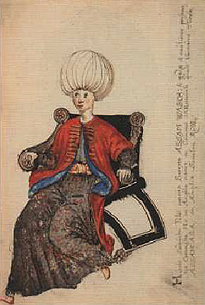
Samson Rowlie (died after 1588) was Chief Eunuch and Treasurer of Algiers during Ottoman rule. Born in Norfolk, England, the son of a Bristol merchant, Francis Rowlie, he was captured aboard of the Swallow [1] and castrated by the Ottomans in 1577. [2] He converted from Christianity to Islam and took the name Hassan Aga. [3] He served the Beylerbey of Algiers, Uluç Ali Pasha.
Richard Hakluyt's 1589 collection, The Principal Navigations, included a 1586 letter from William Harborne, England's ambassador to the Ottoman court, addressed to Hassan Aga, for the purpose of negotiating prisoner release. [4] A 1588 watercolor portrait depicts Hassan Aga with white skin and rosy cheeks, wearing a large turban. He was reported to have been murdered. [5]